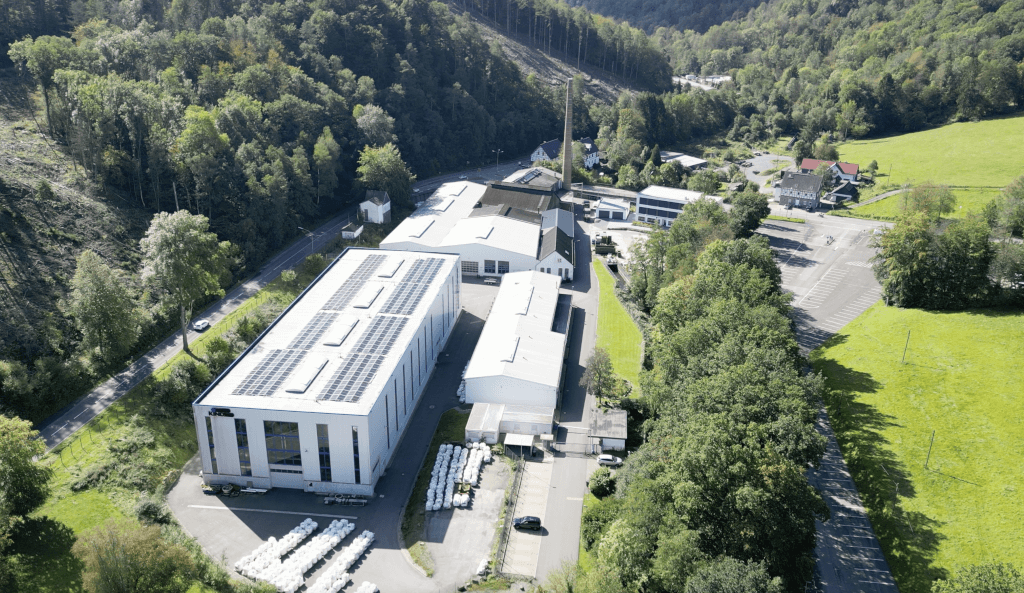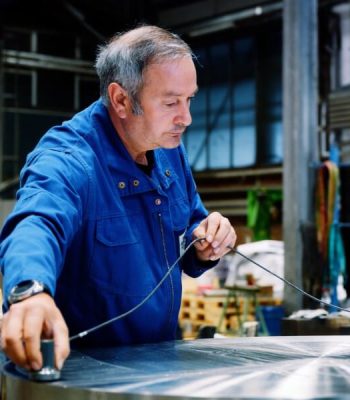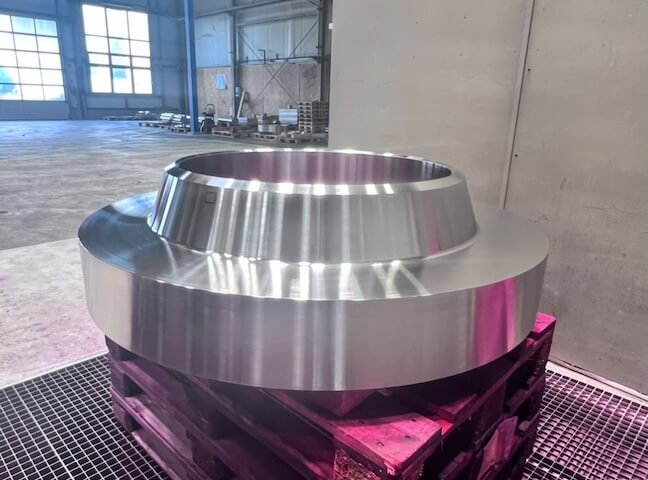The Kind team with a large stainless steel forging for a fusion magnet machine.
Forgings from Germany’s forgemaster, Rolf Kind GmbH, are finding their way into some of the world’s most ambitious projects – from superconducting magnets at CERN to the first generation of fusion power plants. Specialising in customised forgings in stainless steel, titanium, and high-performance alloys, the company is positioning itself at the centre of global shifts in energy and industry. With geopolitical upheaval, the energy transition, and a renaissance of nuclear power reshaping demand, Kind is responding with bold investments in technology, international expansion, and a new generation about to join the family-owned company. At its heart lies the ambition to supply critical components for applications that could transform the world. We spoke with Managing Director Markus Kind to find out more.
By Joanne McIntyre, Stainless Steel World
Accelerating fusion development: from SPARC to Proxima
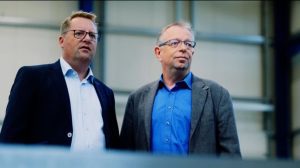
For over two decades, Kind has contributed to fusion energy projects, including ITER. Today, the field is rapidly evolving from government-led research into a commercially driven industry. More than 50 startups worldwide are now competing to build the first fusion power plant, backed by unprecedented levels of private investment.
The momentum is especially strong in the United States. Kind works closely with Commonwealth Fusion Systems (CFS), the world’s leading tokamak-based fusion company, which has raised around USD 3 billion to construct its demonstration plant, SPARC, scheduled for completion this year. Kind has supplied critical forgings for the project and is now preparing for the next milestone: construction of ARC – the first commercial fusion power plant in Virginia, starting in 2026.
Another major development is unfolding closer to home. A German startup has recently entered the fusion field, supported by growing recognition at the government level of fusion’s long-term potential. Kind is now actively collaborating with Proxima Fusion, a Munich-based startup aiming to develop a stellarator power plant. “We have just signed an important contract to supply steel for their first prototype magnet,” Markus explains. “That’s a particularly exciting milestone for us, and it validates our long-term strategy of developing new materials and grades for fusion applications.”
As an active member of the US-based Fusion Industry Association (FIA), Kind is closely following projections that annual global investment in fusion could reach USD 5–7 billion from 2028 onwards, once the first power plants move into construction.
At the same time, Markus remains realistic. “If, for whatever reason, fusion does not materialise as expected – whether due to alternative technologies or unforeseen breakthroughs – we must be prepared,” he notes. To that end, the company is also investing in other emerging industries with strong growth potential over the next 10–15 years.
Successful USA expansion
In 2022, Kind strengthened its presence in the United States by entering a strategic partnership that has since proved highly successful. Building on this momentum, the company established a subsidiary, Rolf Kind USA Inc., in New York in March 2025.
“The US market is attractive to us not only for fusion-related applications but also for our core nickel-alloy business,” Markus explains. “We expect this segment to grow significantly over the next decade, given the size of the domestic market and the relatively lower level of competition compared to Europe.”
For customers, the benefits are immediate. By ordering directly through the US subsidiary, they can avoid complications linked to tariffs, shifting geopolitics, and supply chain uncertainties. Kind has found that smaller and mid-sized family-owned companies, its traditional customer base in Europe, particularly appreciate the ability to deal with a US-based supplier and receive material delivered free-house.
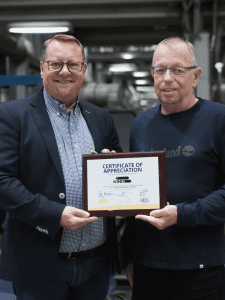
Looking ahead: SMRs & adapting to political uncertainty
Looking ahead over the next 10–15 years, Kind anticipates major global transitions. “The geopolitical landscape has become increasingly complex,” Markus notes, “and this will inevitably force industries to adapt. For us, the challenge is to transform these shifts into opportunities for a German-based company with an international outlook. We believe it would be a mistake to narrow our focus to Germany and Europe alone.”
To remain competitive globally, Kind continues to expand its international footprint. The company already has a strong representative in South Korea and is now seeking a counterpart in Japan, a key market with significant potential. With Rolf Kind USA now established, the company is well-positioned to build stronger ties in North America as well.
Fusion energy will remain a central priority; “For us, the question is how a specialised, mid-sized supplier can participate meaningfully in that future growth,” Markus says.
At the same time, Kind sees strong potential in conventional nuclear energy, particularly with the rise of small modular reactors (SMRs). The company is currently pursuing ASME Section III Material Organisation (MO) Certification, a prerequisite for supplying materials to the nuclear sector.
“SMRs could represent a major business field over the next two decades,” Markus explains. “We are already in discussions with major players such as GE and Rolls-Royce, working to position ourselves within their supply chains.”
The opportunity is vast. GE has indicated plans to build as many as 270 SMRs in the United States alone, using a modular approach that would allow rapid deployment – potentially within three years – once the manufacturing network is established. Many units are expected to be located on existing power plant sites, where coal- or gas-fired facilities can be repurposed and directly connected to the grid.
Material development
In the near term, Kind is reinforcing its role in fusion energy through collaboration with CERN on the development of new material grades.
“Our focus is on materials that can perform even better at the extremely low temperatures required in fusion applications than those ones we are producing today,” Markus explains. Fusion reactors rely on magnetic confinement to contain plasma within a vacuum vessel, with massive superconducting magnets cooled to cryogenic levels. “We are working to identify and qualify alloys that show superior behaviour under these ultra-cold conditions.”
Alongside this, Kind is advancing research in additive manufacturing. The company has launched an internal R&D program, funded at approximately EUR 500,000 annually, to evaluate how novel alloys perform when produced through different 3D printing methods – both powder-based metallurgical techniques and wire-fed directed energy deposition (DED). “We want to understand how these printed materials behave under extreme conditions,” Markus notes.
In addition to its collaboration with CERN on cryogenic fusion materials, Kind is also advancing work with other innovative alloys. “A great example is our partnership with Alleima,” Markus explains. “We are the exclusive supplier of forgings produced from their new Sanicro® 35 alloy. It’s a highly versatile alloy that combines the corrosion resistance of high-alloy austenitic stainless steels with the strength of nickel alloys. Our initial forging productions have delivered very promising results.”
Third-generation family business
In the longer term, Kind is preparing for a generational transition. “My two nephews, and potentially also my children, are very interested in joining the company, so over the coming decade we will gradually integrate the third generation into our business,” Markus explains. “It’s a careful, step-by-step process, but also a privilege to continue the Kind family legacy.”
As part of this transition, the company has engaged an external consultant to run a year-long program aimed at defining and strengthening its core values. Working together with Susanne Kremeier from People & Results, our goal is to envision what Rolf Kind should look like in 25 years,” Markus says. “It’s an ambitious project, but a necessary one given how uncertain the future can be.”
He sees real value in the perspective younger generations bring. “Their energy and ideas can propel us into areas where we are not yet active. I’m very open to hearing their views, whether it’s the role of simulation in manufacturing, the use of advanced databases to predict material behaviour, or other technologies that could transform our work.” At the same time, Markus acknowledges the ongoing challenge: “The future will require us to find the right balance between innovation and tradition.”
Rapidly changing markets and supply chains
Markus observes that the current geopolitical climate is driving many industries toward a form of de-globalisation. “We see a growing tendency for companies to focus more heavily on their domestic markets,” he notes. “For us, as a small German entity, the challenge is to continue thriving under these conditions by strategically expanding into new regions.”
Kind remains committed to international growth. “India is experiencing a strong resurgence, making it a market well worth deeper exploration,” Markus explains. “And the United States remains a global powerhouse, consuming potentially more forgings than the rest of the world combined. The demand there for high-quality products aligns perfectly with what we offer.”
He also sees promising prospects in Japan, where customers are actively seeking reliable suppliers. “Ongoing political shifts are prompting many companies to turn to Europe for their forging needs,” Markus says. “It’s not an easy environment to navigate, but it’s also full of opportunity. Challenging, yes – but very exciting.”
Germany’s industrial landscape is also undergoing rapid change, Markus explains, with energy-intensive sectors such as chemicals and steel facing severe challenges, raising doubts about their long-term competitiveness. “It is becoming increasingly clear that energy-intensive industries like major chemical producers will no longer prioritise investments in Germany,” Markus observes. “Instead, we expect to see new projects shift toward Asia or possibly back to the United States. The question for us is how these new supply chains will develop, and how we can position ourselves to be part of them.”
Substantial investments
The company continues to invest heavily in advanced manufacturing technology to strengthen its forging capabilities.
“We are planning significant upgrades at our Kaiserau workshop,” Markus explains. “This includes equipment capable of performing multiple operations simultaneously – such as turning and milling in a single setup – eliminating the need to transfer workpieces between machines. In addition, we are investing in five- and seven-axis machining centres as part of a planned EUR 4 million program over the next five years.”
These investments will allow Kind to deliver forgings with even higher degrees of finished machining, expanding the scope of components supplied directly to end-users.
The value of people
“Our people are the most important capital we have,” Markus emphasises. “You can have the best ideas, but without a strong team to carry them forward, they amount to nothing.” Fortunately, Kind has been successful in attracting talent. “We are fortunate not to face serious challenges in recruiting,” he says. “Our focus on new markets such as fusion energy makes us an appealing employer in the Kaiserau and Lindlar regions, where many companies remain tied to more traditional technologies. By positioning ourselves as pioneers, we attract motivated people who want to help shape the future.”
The company now has a young, dynamic team that is actively engaged in driving Kind forward. “It is vital to instil our values in this next generation, so they can carry the company’s legacy while also preparing it for the challenges ahead.”
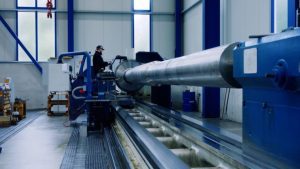
Working to change the world
Given the challenges of international markets and the complexity of running a global business, what motivates Markus each day? He smiles: “The company is my biggest challenge but also my favourite hobby. Building it up over the past 20 years and seeing it grow has been like watching a child mature. My greatest motivation is to stay creative and to find ways to make it even more successful in the future.” Despite pressures such as de-industrialisation, geopolitical crises, and tariffs, Markus views these obstacles as opportunities. “I enjoy the challenge of not only surviving, but growing.
It’s fascinating—and a lot of fun. Now that the next generation of our family is getting involved, their ideas and perspectives make me even more optimistic about the future.”
Looking further ahead, Markus is clear about his ambitions for the company: “In 20 years, I hope Kind will still be supplying special parts for applications that can change the world. If fusion technology becomes a reality, it could create a carbon-free future for all of us. That possibility is a huge motivation for me. I would be very proud if Rolf Kind plays a meaningful role in these developments over the next two decades and beyond.”
About this Featured Story
Appearing in the August 2025 issue of Stainless Steel World Magazine, this Featured Story is just one of many insightful articles we publish. Subscribe today to receive 10 issues a year, available monthly in print and digital formats. – SUBSCRIPTIONS TO OUR DIGITAL VERSION ARE NOW FREE.
Every week we share a new Featured Story with our Stainless Steel community. Join us and let’s share your Featured Story on Stainless Steel World online and in print.



